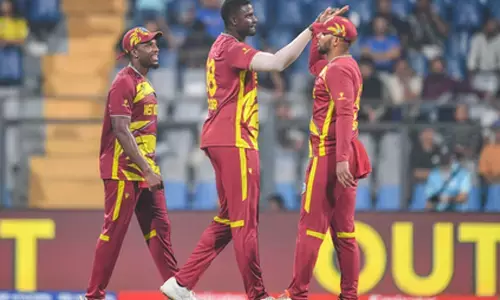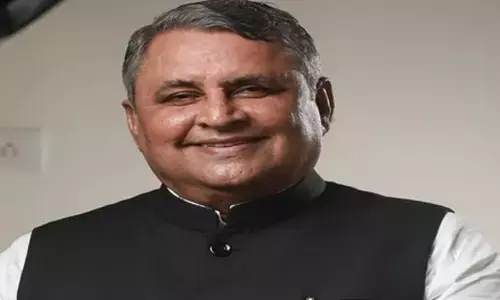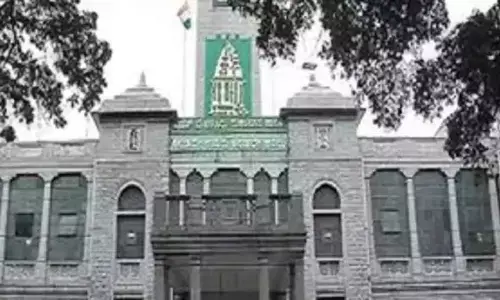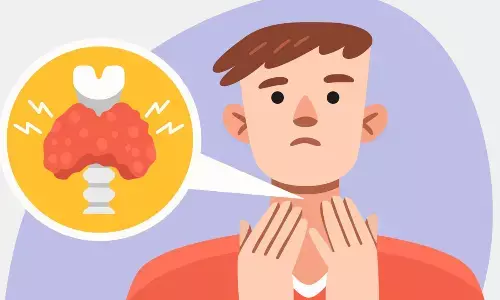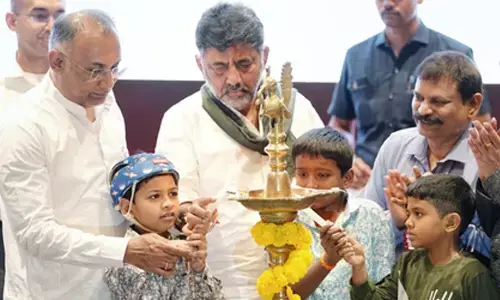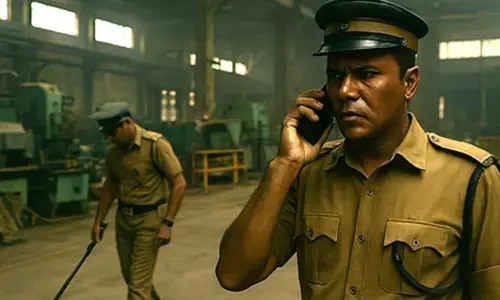A tale of two tall leaders cut short
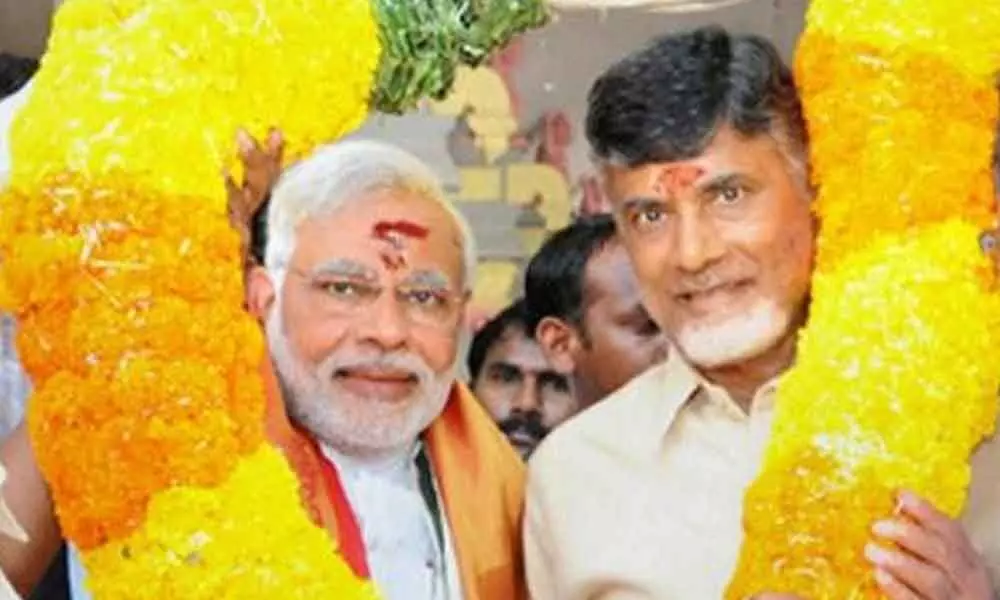
Prime Minister Narendra Damodardas Modi & Nara Chandrababu Naidu
A flash news, on the International Men’s Day, as the Prime Minister Narendra Damodardas Modi announced his government’s decision to repeal the three most controversial farm laws following an apology took the nation by surprise.
A flash news, on the International Men's Day, as the Prime Minister Narendra Damodardas Modi announced his government's decision to repeal the three most controversial farm laws following an apology took the nation by surprise. Hours after the unbelievable U-turn, both the Telugu States came in for another shocker in the form of an inconsolably sobbing Nara Chandrababu Naidu, Telugu Desam Party president and former Chief Minister, following an unbearable humiliation in the Andhra Pradesh Assembly.
Both the septuagenarian leaders, known for their political shrewdness, adamancy and notoriety, made the day's news. Backtracking of Modi and breaking down of Naidu are indeed uncharacteristic of their personas.
The farming community, primarily from Punjab and Haryana, has been up in the arms from the day (June 3, 2020) the Union Cabinet chaired by Modi took "historic decisions" and approved three ordinances¬– Essential Commodities (Amendment) Ordinance, 2020; The Farming Produce Trade and Commerce (Promotion and Facilitation) Ordinance, 2020; and The Farmers (Empowerment and Protection) Agreement on Price Assurance and Farm Services Ordinance, 2020 without much ado.
As the three ordinances became laws without much discussion, farmers took to the streets. They braved Covid-19, State's brutal tactics and withstood rough weather on the borders of national capital for about one long year forcing Modi to back down on Guru Nanak's Prakash Utsav day, celebrated to mark the birth of the first Sikh guru, Guru Nanak.The farmers' struggle, described as the longest protest in the independent India, witnessed a series of unsavoury incidents.The government failed to convince ryots during theten rounds of talks and its willingness to defer the implementation part for a couple of years too went for a toss. As many as 700 agitating farmers have reportedly died so far.
Debunking the government's propaganda machinery that only big farmers are behind the protests, a study carried out by two economists associated with Punjab University revealed that those who died during the protest had no more than an average of 2.94 acres of cultivable land.
Nobody can say that each and every provision of the three Acts is anti-farmer but the way the government brought them in by skirting debate and discussion led to suspicion and outrage.
Political compulsions in the run up to the Assembly elections in key States might be the reason for the sudden somersault but the farmers' protracted struggle against all adversities remains an inspiration for those who felt betrayed by the governments.
Our politicians are in undue haste to push things through. They ignore processes and destroy systems to get things done for their advantage. They commit mistakes and cover them up to save their skin. Politicians, forget about rulers, tendering an apology for their past mistakes and wrong reading of the situation is very rare. Completely blinded by power, the powers-that-be don't even care people's demand for their apologies. Correction course, sadly, is a taboo in the present-day politics and administration.
Modi, true to his political shrewdness, didn't make his apology very obvious in his speech due to strategic reasons. It may be recalled that the former Prime Minister Indira Gandhi had to publicly apologise for all the mistakes and excesses committed during the Emergency (25 June 1975 to 21 March 1977).
Having burnt her fingers badly due to the anti-democratic decision, addressing a large public meeting at Yavatmal (Maharashtra) on January 24, 1978, Indira declared that she was taking the entire responsibility for the same. The Bollywood stars, cricketers, intellectuals, who lent their support to the farm laws only to please the Union government without understanding the provisions a bit, should also publicly apologise.
Farmers showed their sense of disenchantment by not succumbing to the PM's announcement. In a rebuke of sorts, the Samyukt Kisan Morcha, the umbrella body of the farmers' unions, led by the Bharatiya Kisan Union's Rakesh Tikait have not paid heed to the PM's request to 'go home to celebrate the festival and start afresh.'
Given the Morcha's list of demands, including the arrest of the Union Minister Ajay Mishra's son for mowing down four farmers with his car at Lakhimpur Kheri during a protest last month, apparently the issue is still very much alive and it may take some time to find an amicable solution to the vexed issue. "Mafi mangne se bhala hone wala nahin hai... kisanon ka bhala MSP par kanoon banane se hoga" (Farmers will gain nothing by apology... they will benefit only by making law on MSP), Tikait said.
You may be surprised to know that apologies in fact don't work. Richard Hanania of Columbia University conducted an experiment to understand public response to leaders' apologies and found that apologising after a gaffe might not be the right way to go. It in fact acknowledged the general perception that apologising might make leaders appear weak, which in turn may make them less likeable. "The evidence suggests that when a prominent figure apologises for a controversial statement, individuals are either unaffected or become more likely to desire that the individual be punished," the researcher mentioned. Instead of committing mistakes and tendering apologies, hence, it's wise to avoid them by reposing faith in democracy and scrupulously adhering to the democratic norms without fear or favour. There shouldn't be a place for hidden agendas or dark deals.
Babu's woes in AP
Back home, the TDP supremo's public breakdown at a press conference, televised live by a good number of friendly news channels, too created a stir on the same day. Perturbed by the gruelling running commentary made by a couple of ministers in the Assembly, the Opposition leader staged a walk out by announcing that 'I will come here as the Chief Minister,' akin to the late former CM of Tamil Nadu Jayalalithaa in 2012.
Naidu was particularly pained by a demand for a discussion on the birth of his son. It is very sad that the ruling party members used meanest ways and cheapest tricks to irritate the Opposition leader. The former CM's allegation that the ruling party launched a very harsh and derogatory verbal attacks on his wife, Bhuvaneswari in the Assembly was challenged by the Chief Minister Jagan Mohan Reddy.
It is disheartening to see one of the tallest leaders of national politics, Naidu, who ruled the State for 14 years, sobbing due to a political onslaught of rivals. The TDP founder NT Rama Rao was equally heartbroken with the way Naidu polarised his family members and party leaders by showing the former's wife Lakshmi Parvathi as an alibi during the grand political coup in 1995.
Roja, a firebrand leader and former film actress, was humiliated under the nose of Naidu. TDP leaders, apparently at the behest of the leadership, did make poor comments against the family members of political opponents. Surprisingly, Naidu's former disciples, belonging to his own community, are browbeating him more severely than others.
Had he reined in leaders with unethical practices and accorded due respect to women within and outside the party, Babu would have earned more sympathy at this juncture. I was aghast to see Naidu, in the capacity of the CM in the Assembly, seeking to know as to how Modi can take care of the government when he failed to take care of his wife.
The war of words in Andhra Pradesh is going overboard and the unprintable foul language used by certain leaders to pin down opponents is sending wrong signals. The AP CM dropped hints that he would go Modi's way in honouring the farmers' march against the three capitals idea on Monday morning but it proved to be wrong by evening. We don't know what is in store for AP.
It is proved beyond doubt that Modi had to eat crow due to his disregard to democratic discussion and his strong belief that brute force can work wonders took a beating. Similarly, Naidu is paying for his own making.
The speech of Chief Justice of India NV Ramana at the 40th convocation of Sri Sathya Sai Institute of Higher Learning, a day before the 96th birth anniversary of Satya Sai Baba, should serve as a lesson for Modis, Naidus, Jagans and all other politicians in the country.CJI suggested that rulers should introspect everyday whether the decisions taken by them are good and also check if they have any bad characteristics.Every politician, in fact, should introspect every day for a better society with democratic spirit.
(The author, a PhD in
Communication and Journalism, is a senior journalist, journalism educator and communication consultant)
(The opinions expressed in this column
are that of the writer. The facts and opinions expressed here do not reflect the views of
The Hans India)



